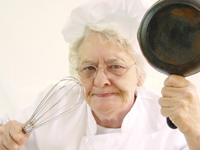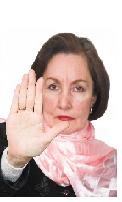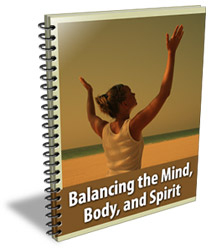|
What is Menopause?
A woman’s change of life is a perfectly normal event which starts in the mid
or late forties to fifties. It signifies the end of the female reproductive period of life which commenced at
adolescence in the early teens. There are several misconceptions about it. Many women at this time feel that they are
growing old and that they are well past their full physical vigour. Other women feel that it brings a cessation of sexual pleasure. These apprehensions are far from true. This even may be considered an end to women’s fertility but certainly not to her virility. It does
not decrease a woman’s physical capacity or sexual vigour or enjoyment.
At the turn of the last century, menopause and death occurred at roughly the same ages, but now the average woman who reaches menopause will live 30 more years. Menopause is the cessation of ovulation; that is, the ovaries no longer release eggs and no longer secrete estrogen and progesterone. The average age for menopause is 51, and perimenopause, the transition from regular functioning of the ovaries to its absence, can take from one to ten years.
Signs & Symptoms of Menopause
During the menopause, the entire chain of endocrine glands is disturbed, particularly the
gonads, thyroid and pituitary. In a really healthy woman, the menopausal change takes place
without any unpleasant symptoms. The only sign that the "change " taking place is the cessation
of menstrual flow. There are, however, many women who do not enjoy good health due to
dietetic errors and a faulty style of living.
In these cases, the menopausal change often leads to
all kinds of distressing physical, emotional and nervous symptoms and manifestations. • Hot flashes, Other symptoms are Not
every women will get these severe reactions. The severity or otherwise of the symptoms depend
on a variety of factors such as general health, previous surgery and radiation. Menopause and
its problems are usually over when menstruation stops.
There are many signs and symptoms of menopause, which occur
when a woman stops menstruating. The gradual menopause
transition is due to fluctuating levels of female hormones
progesterone and estrogen. Menopause normally occurs in the age
range of 48-55 years. Such signs and symptoms of menopause occur
still earlier in women who have never been pregnant and who
smoke regularly. Absence of menstrual periods for a full year is a sure
indication of the onset of menopause. Hot flashes and mood
swings are among the most common signs and symptoms of
menopause experienced by more than eighty percent of women. Hot
flashes are a sudden warm feeling in either your neck and face
or your whole body. Hot flashes normally with sweating and cold shivering could
form red notches on your arms, back, and chest. Hormonal
changes disrupt your body's natural ability to regulate body
temperature. You experience this common sign and symptom of
menopause in the middle of the night, disturbing your sleep.
Mostly hot flashes last from thirty seconds to five minutes. Other common signs and symptoms of menopause include
depression, mood swings, and memory loss. You gain weight
around the waist and experience loss of stretchiness in the
skin. Lower estrogen levels leads to brittle bones, which lose
their calcium contents and become weak causing osteoporosis.
Falls in estrogen levels also increase risks of heart diseases.
Not all women experience all signs and symptoms of menopause. Irregular periods are among the most general signs and symptoms
of menopause. Some women experience heavy bleeding for more than
ten days with periods occurring within three weeks. Vaginal and
bladder problems are few other signs and symptoms of menopause.
Vaginal infections are also common, sometimes leading to
problems in the urinary tract like incontinence, burning
sensation or pain when urinating. Lower libido is another common sign and symptom of menopause.
Genital body tissue becomes drier and thinner causing pain
during sexual intercourse. Vaginal discomfort often causes
lower sexual arousal. Restlessness, anxiety, panic, depression
are all different signs and symptoms of menopause, often a
fallout of lack of sufficient rest due to disturbed sleep and
higher stress levels. Other signs and symptoms of menopause include fatigue and sleep
problems, buzzing in the ear, etc. You are unable to sleep again
after waking up in the middle of the night. This causes fatigue. You also experience stiffness in joints and muscle pain. Thinning of hair and increased facial hair due to higher levels
of testosterone are other signs and symptoms of menopause. It is however, not necessary for all women to experience all
such signs and symptoms of menopause. Some women may not
experience most of them while some others could experience all
of them. All signs and symptoms of menopause depend largely on
fluctuation of your hormone levels and your individual body
capability to bear such hormonal fluctuations.
What Causes Menopause? The annoying symptoms associated with menopause arise from the fact that the ovaries are no
longer producing their normal amount of estrogen, the dominant female hormone. Anything
which interferes with the normal functioning of the ovaries may also bring about these
symptoms. The same strange feelings may occur if the ovaries are removed by surgery because
of disease. This can also result from heavy X-ray therapy or the use of radiation. A lack of normal hormone balance may also result in a severe backache. This is caused by
thinning of the bones arising from the low level of estrogen in the bloodstream. Unless properly
treated, this may eventually lead to a collapse of one or more of the vertebrae.
Lack of a normal hormonal balance Lack of a normal hormonal balance may also result in a severe backache which is caused by thinning of the bones. This condition is called osteoporosis and arises from the low level of estrogen in the bloodstream.
How do you feel about entering menopause? Do you think you can
live with menopause? It seems a woman in menopause faces
physical changes and new emotional realities. Are you also
feeling the same? Do you feel stress and uncertain with what
happen to your body? Although Eastern and Western disciplines disagree in the
interpretations of stress response and their prescriptions for
how to deal with it, recognition has grown in both disciplines
that body and mind are intertwined, working together - or
against each other. The Western interpretation is based on research into the
"flight or fight response," first identified by Dr. Walter
Cannon in the 1930's. In response to threat, the body's
sympathetic nervous system goes into action. The adrenal gland
pumps out more epinephrine, which speeds up the heart rate and
constricts blood vessels. The breathing rate increases, and the
blood coagulation system is activated so that blood will clot
more quickly in case of injury. For the earliest ancestors,
these responses gave the body the jump start it needed to flee
from a menacing animal or enemy - or to stand and fight - thus
the label "fight or flight." Accumulated stress can literally
make you sick. In Eastern philosophies, practitioners believe that such stress
causes the body to build up certain toxins that must be released
or they will block energy flow throughout the body. While most of us associate negative stress with harmful body
changes, it's also possible to "stress out" with too much good
news. Whatever it is, those both interpretations are related to our
body. Sure you don't want to get weak body because of stress
while you live with menopause. Therefore here are some
checklists you need to do while you live with menopause: 1. Life has become visibly more complicated. Don't feel that
you have to do everything and do decide what critically needs
to be accomplished. Think about your values and write down
those that really matter to you. What is most important?
Spending time with family? Accumulating great wealth? Achieving
powerful influence? Acquiring possessions? Expressing yourself?
Learning new ideas? Experiencing adventure and travel?
Maintaining excellent health? Socializing with friends?
Contributing to the community? You can't do them all. Cut out
activities that aren't consistent with your core values. 2. Carry a smaller wallet or purse. Start by cleaning out the
one you've got. Get rid of unnecessary credit cards and other
clutter that you don't use regularly. 3. Stop checking up on your financial portfolio every day. Most
people invest for the long term. Checking your results daily
adds to stress and might lead to expensive and unnecessary
changes. 4. Make time for yourself. Set aside time each day to reflect
quietly, go for a walk, plan for your future or meditate. Visit
the park instead of the mall. 5. Cut back on debt. Consolidate your different debts into one
and pay it off. Put your credit cards in a spot where you won't
be able to use them until you're debt-free. Track your expenses
for a month, then cut back your spending on items you don't
need. For instance, pack a lunch rather than buying one at
work. Mix and match your outfits rather than constantly buying
new ones. 6. Consider renting a vacation home rather than buying. You
won't be burdened by time (and money) spent in maintenance.
Also, this allows you to visit a different spot each year. 7. Plan time for a vacation every year. Some people claim "I
haven't had a vacation in three years" as if it was a badge of
courage. It isn't. 8. Cut back on your children's planned activities. If they have
to use a time planner to schedule their activities, and you
spend all of your time taxiing them around, they're probably
too busy. 9. Live closer to your work so you don't have to drive. 10. Take a moment each day to be grateful.
Natural herbal remedies to help prevent side effects of menopause:
The most prominent of these is Tang Kuei. In any study of the problem it is highly recommended that you take a closer look at this product and what is recognized to do in assisting with menopause and Pre Menstrual Tension problems. Detail available at Tang Kuei.
• Hot Flashes - Hot flashes are one of the most common symptoms for women during menopause. Hot flashes can last up to 6 minutes and can potentially occur several times within one day. Herbal Remedy – Black Cohosh (also known as squaw root, black snake root or rattle weed) has been studied and is proven as a reputable treatment for hot flashes. • Insomnia – Many women experiencing menopausal symptoms also have difficulty sleeping. If you suffer from sleeplessness on a regular basis, you probably suffer from chronic insomnia. Herbal Remedies – Kava (or Kawa) is used throughout the world as a remedy for anxiety and insomnia. Other remedies proven effective for treating insomnia and sleeplessness are Valerian root and HOPS. • Depression and Mood Swings – Although most people joke about women becoming depressed and moody during menopause, these symptoms are very serious and if not treated properly can become dangerous and harmful. Herbal Remedy – St. John’s Wart (also known as goat weed) has proven to be an affective antidepressant in reversing the feelings of depression which many menopausal women experience. • Abnormal Hair Growth – Abnormal hair growth (also called hirsuitism) is perhaps one of the most embarrassing symptoms for women suffering from menopause. Abnormal hair growth can occur anywhere, although above the upper lip is usually a common target.
Menopause Treatments:
All women face menopause after the age of 50 years. Menopause
occurs over a few years and this time can be very trying for a
woman. A reduction in production of the female hormone estrogen
and progesterone results in osteoporosis, hot flushes and
general fatigue. A lot of research in this field has created
effective menopause treatments. Since hormones are involved,
all menopause treatments should be in consultation with one's
doctor. Menopause treatment begins with a change in a woman's dietary
habits. One has to take calcium in the form of tablets or in
natural dairy products and vegetables. She must decrease
consumption of caffeine products like tea and coffee. This is
helpful in preserving bone density and increases absorption of
calcium. Other menopause treatments include physical exercises to build
strong bones. This must be in the form of a brisk walk or
weightlifting exercises to strengthen her bones. Exercising
regularly also helps in weight reduction. It is good for the
heart and can reduce one's cholesterol level. Menopause treatments for hot flushes involve consumption of
natural products like soy and tofu that contain natural
estrogens. One can have them in raw or cooked form. Scientific
studies indicate that soy definitely reduces hot flushes. Several medicines can form a part of menopause treatments. The
intake of belladonna and clonidine can considerably reduce hot
flushes. However, one must study their side effects before
consuming them. Some medicines induce sleep while others can be
dangerous for those having blood pressure. Another very popular menopause treatment is hormone replacement
therapy. This therapy involves taking the estrogen and
progesterone hormones orally or in the form of topical creams. Women who have their uterus intact must take both hormones in
regulated doses. It is important to decide the dose as per the
doctor's directions since the intake varies from person to
person. A doctor's guidance is a prerequisite for hormone therapy.
Estrogen replacement can banish all symptoms of menopause like
hot flushes, fractures and help build bone mass. This is
because this form of menopause treatment can lead to breast
cancer, blood clots and a host of other medical problems. It is
important to know the woman's medical record and family history
of cancer. Women who are prone to cancer are not advised this
menopause treatment. Hormone therapy is available in the form of tablets and creams.
Women under 50 years experiencing early menopause can safely
take these types of menopause treatments. However, one must
undertake a mammogram once in two years, if on hormone therapy.
A host of menopause treatments is now widely available due to
rapid advances in science. However, a woman must take a
suitable treatment according to her needs and strictly under a
doctor's supervision.
Menopause Hormones The main problem with menopause is that there is a drastic
reduction in production of the female hormones. This is what
causes all the physical discomfort and hot flushes in
menopause. It is important to take these menopause hormones strictly under
a doctor's guidance. A doctor studies the patient's symptoms and
entire family history and then recommends the correct dose and
combination of menopause hormones. This ensures that the
patient is not at risk and is taking the right menopause
hormone. Women can take either one or both menopause hormones depending
on their physical condition and age. Women who have undergone a
hysterectomy must take both estrogen and progesterone. Such
women have a greater risk of heart disease, blood clots and
breast cancer. Women taking estrogen alone have a chance of
suffering a stroke. Menopause hormones give good relief from hot flushes and
vaginal dryness. There is no proof that they prevent heart
disease or improve one's general health. The benefits of
menopause hormones vary with age. Women with early menopause
greatly benefit from a short course of menopause hormones.
Older women who take menopause hormones have a greater risk of
developing breast cancer or tumors. There is a need to regulate the duration of menopause hormones.
One must take estrogen daily and progesterone about twice a
week. The exact dosage varies with the patient's symptoms and
medical condition. However, it is worth taking menopause
hormones for a short time and not on a continuous basis. A woman must regularly review the dosage of menopause hormones
with her doctor. If the hot flushes have ceased, she must stop
taking menopause hormones gradually. She can also shift to
other localized medication like creams and patches. Menopause
hormones are not a cure for age related problems like
osteoporosis and heart disease. They are the last step in
therapy when other medications have failed for these medical
conditions. Thus, a doctor must prescribe hormones only after a
detailed study of the patient's medical record. Menopause
hormones are not a magic cure for the symptoms of menopause,
but they do gradually lessen some of its symptoms like hot
flushes. The Demise of HRT
Researching remedies and treatments is the best way to prepare for this stage of your life. This way, when it does happen, you’re aware of what to expect and the best ways to deal with it. Outdoor exercise like walking, swimming etc is helpful Natural Approaches for Treating Symptoms There are many natural approaches that may help with the symptoms of menopause:
Diet change strategies: Menopause Supplements Menopause is the most trying and difficult period in a woman's
life. It usually occurs to a woman, who is in her late 40s.
During menopause, the quantity of female hormones produced
reduces significantly. This results in many physical and mental
changes in a woman's body like loss of calcium, hot flushes, dry
skin, itchiness, and osteoporosis. However, women today are more
aware of this phase of their life and willing to face it. They
are ready to take menopause supplements that will help fight
menopause. Menopause supplements help reduce many of the
menopause symptoms and reduce the physical discomfort faced by
several women.
Menopause supplements come in both natural forms and as medical
supplements. It is always better to take a natural menopause
supplement in the form of green vegetables. Natural ingredients
also do not have any side effects compared to medicines. The
advantage of natural estrogen is that it is not carcinogenic
unlike medical supplements that can cause cancer. Several plants like soy contain estrogen in the natural form.
Soy contains isoflavones that can mimic estrogen and give good
relief from hot flushes. One must take soy either raw or cooked
to benefit from the isoflavones. The best source of isoflavones
is pomegranates. Red clover, dong quai and licorice are other
sources of plant estrogens that form natural menopause
supplements. One can consume these natural menopause supplements as whole
fruits or vegetables or as pills available at pharmacists. One
can eat soy flour or eat bread made from soy flour. Such
products are now readily available in the market. Women can
consume these products before the onset of menopause to get
relief from hot flushes. A woman can take menopause supplements in the form of hormone
therapy. This therapy varies for every woman depending on her
medical and family history. In this menopause supplement, the
woman gets estrogen and progesterone in different doses
according to her need. A woman with a uterus receives both
hormones while a woman who has undergone a hysterectomy gets
estrogen. Women can take hormone replacement therapy in the form of oral
medication or as topical application in the form of ointments.
The dosage and frequency of the medicine depends on the
individual. This menopause supplement should stop when the
symptoms subside. This is because it can cause blood clots and
breast cancer if taken over a long time. There are several menopause supplements available in the
market. These contain a mixture of soy and flax seeds. The
fiber is good for digestion and one is consuming natural
estrogen. Other experts recommend consumption of gingko,
seaweeds and ginseng for relief from menopausal problems. Nowadays there is a variety of menopause supplements available
in the market. However, since they regulate the hormonal
balance of the body one must take them carefully under a
doctor's guidance. A woman must choose the menopause supplement
best suited for her condition and after a careful consideration
of its side effects. Menopausal Disorders treatment using Nutrients Menopausal Disorders diet Using Ayurveda Therapy: Although menopause cannot be avoided, it can be postponed for as long as 10 to 15 years and
it can be made a smooth affair when it comes, with a proper nutritional programme, special
supplements and the right mental attitude. When a woman is affected by the menopausal change to any marked extent, it is a sure sign
that her body is in a toxic condition and in need of a thorough cleansing. For this purpose, she
should undergo a course of natural health building treatment. Diet is of utmost importance in such a scheme of treatment. In fact the problems at menopause
are often much more severe than that at puberty largely because the diet has been deficient for
many years prior to its onset, in many nutrients such as protein, calcium, magnesium, vitamins
D, E and pantothenic acid. The diet should be made up from three basic food groups, namely (i) seeds, nuts and grains (ii)
vegetables and (iii) fruits. The emphasis should be on vitamin E-rich raw and sprouted seeds
and nuts, unpasteurised high quality milk and home-made cottage cheese and an abundance of
raw, organically grown fruits and vegetables. Plenty of freshly made juices of fruits and
vegetables in season should also be included in this diet. All processed, refined and denatured foods, such as white sugar, white flour and all articles
made with them, should be completely eliminated. Take special supplements such as vitamins
C, B6 and pantothenic acid, which have a specific property of stimulating the body’s own
production of estrogen or enhancing the effect of the existing estrogen. During menopause, the lack of ovarian hormones can result in a severe calcium deficiency. For
this reason, a larger than usual intake of calcium may help greatly. Vitamins D and F are also
essential for assimilation of calcium. Any woman having difficulty at this time should supplement
her daily diet with 1,000 units of natural vitamin D, 5000 milligrams of magnesium and two grams
of calcium daily, which can be supplied by one quart of milk. During the manopause, the need for vitamin E soars 10 to 50 times over that previously
required. Hot flashes, night sweats and other symptoms of menopause often disappear when 50
to 100 units of vitamin E are taken daily. The symptoms recur quickly if the vitamin is
discontinued. Of late, it has become popular to take estrogen to prevent or postpone menopausal symptoms.
Although hormone therapy is apparently successful and will, in many cases, help the patient to
feel and act younger, it cannot be recommended in all cases because of its carcinogenic effect.
If, however, estrogen therapy is undertaken, it should never be administered at the same time as
vitamin E therapy. Ingestion of estrogen and vitamin E should be separated by several hours.
Beet juice has been found very useful in menopausal disorders. It should be taken in small
quantities of 60 to 90 ml at a time thrice a day. It has proved much more permanently helpful
than the degenerative effects of drugs or synthetic hormones. Carrot seeds have also been found valuable in menopausal tension. A teaspoonful of the seeds
should be boiled in a glassful of cow’s milk for about 10 minutes and taken daily as a medicine in
this condition. Plenty of outdoor exercise, such as walking, jogging, swimming, horse-riding or cycling, is
imperative to postpone menopause. Other helpful measures in this direction are avoiding mental
and emotional stress and worries, especially worry about growing old, sufficient sleep and
relaxation and following all general rules of maintaining a high level of health. The healthier a
woman is, the fewer menopausal symptoms she will experience. The menopause can be made a pleasant affair by building bodily health and a sane mental
outlook. From puberty to menopause, a woman has been somewhat of a slave to her female
glands. At specified intervals she was inconvenienced by her menstrual periods. She bore
children, enduring the pain and discomfort of pregnancy. Menopause relieves her of this
bondage to her femininity. She can now experience some of the happiest days of a woman’s life.
A whole new life is given to her, if she is wise enough to prepare for it and accept it as such.
Vitamin & Nutrient Associations Because the body is going though hormonal changes it can take years to readjust to the new levels. Some herbal remedies can treat symptoms that are less severe. If you are taking hormone replacement drugs consult with your physician before taking herbal remedies. • Dang Ghui - Tang Kuei – Used in ancient Chinese medicine, this herb helps with many symptoms of menopause. It works in much the same way as estrogen replacements work but in a milder way and without the side effects. Taken in capsule form, take up to 6 500-milligram capsules per day. Do not use if pregnant. • Red Raspberry – Red raspberry is known to strengthen the uterus, helps decrease heavy menstrual flow and relaxes muscles. Take as a tea, and drink one or two cups per day. • Licorice Root – Used in ancient Chinese medications for female reproductive problems, this herb helps control water retention and breast tenderness. It also decreases symptoms associated with the fluctuation of hormones such as what occurs in menopause. • Saw Palmetto (also known as Serenoa repens or windmill palm) is used for treating men with enlarged prostates as well as for women who are experiencing abnormal hair growth during menopause. Women & Estrogen Even when we try to eat well, we're disadvantaged. The nutritional content of most food has been compromised over the years, not only by deficient soils and modern production, transportation, storage and processing methods, but also by the enormous amounts of chemical and artificial substances added to promote growth, storage life, taste and appearance. It's for this reason that more and more medical authorities are advocating the use of vitamin and mineral supplements. As Aloe Vera Juice is a refreshing and anti-bacterial drink, you might find that taking this daily, diluted in some filtered water will not only refresh you like ‘a shower inside you’ but also assists in dealing with any digestive issues you may also be experiencing. You may find benefit from our information on detoxification as well as a bit about detoxing because of change of diet We wish you well in your search for solutions to this Menopause problem and your movement towards better health in all areas. More Resources available about Menopause :
What is Hormone Replacement Therapy? Hormones Creating Harmony These are only a few of many possible problems, which may result from imbalances in the hormonal secretions of the endocrine system. Here we have not even mentioned the obvious and severe malfunctioning of the endocrine glands, which produce cysts, gross malformations and malfunctioning in the body. Even in cases where hormones may not be the main disturbing factor, they will almost always be involved or affected in some way because of their extremely important role in the «master control mechanism» of the body. Along with the two other vital hormones - progesterone and
estrogen - testosterone production declines as a woman ages.
Low testosterone women may experience certain symptoms, the
most notable symptom being low libido. However, low
testosterone in women can also contribute to depression and
osteoporosis. Menopause: It's About Balance The medical community is quickly evolving its understanding of menopause. Following the abrupt, early halt to the HRT portion of the Women's Health Initiative last July, due to findings that Hormone Replacement Therapy's risks outweighed its benefits, headlines now read "Menopause is not a disease, but a normal part of life." Hormone "replacement" therapy (HRT) has become simply hormone "therapy" (HT) in recognition of the fact that replacing estrogen is not natural and brings dangerous side-effects, rather than the fountain of youth once touted. Shocking and novel as these concepts may be to today's medical community, they are nothing new to Maharishi Ayurveda, a consciousness-based natural medical system from ancient India. For over 5000 years, Ayurveda has acknowledged menopause as a natural transition, not a mistake of Mother Nature's that requires hormone replacement therapy. Maharishi Ayurveda reassures us that menopause can be health-promoting, spiritually-transforming and free of troublesome symptoms. Experts today are affirming this positive view of menopause, stating that it is not natural to get weak bones, heart disease and rapid aging after menopause. Rather, osteoporosis, heart disease and other chronic health problems develop over a lifetime, resulting largely from poor diet, stress and lack of physical exercise. And hormone replacement therapy (HRT,) once heavily promoted as the medical solution to these problems, is no longer recommended for their treatment or prevention. Menopause: A "Balance Deficiency" What is recommended for the prevention of major health problems after menopause is a healthy lifestyle. And, according to Ayurveda, healthy living is also the best way to ease symptoms of the menopause transition itself. How balanced, or overall healthy you and your lifestyle are when you reach menopause largely determines how smooth your transition will be. If you are "burning the candle at both ends" in your 30's and early 40's, you are more likely to have mood swings, sleep problems and troublesome hot flashes when your hormones start to change. Whereas if you are have healthy lifestyle habits and are managing your stress effectively, you are likely to breeze through menopause without any major problems. Health problems at menopause represent imbalances in the body that were already growing in the body and are unmasked by the stress of shifting hormones. Menopause symptoms are Nature's wake-up call to let you know you need to start paying more attention to your health. Age forty-five to fifty-five is a critical decade, according to Ayurveda. It provides the foundation on which your later health is laid. Just like putting money in your IRA, timely investing in your health can dramatically increase your "yield" of healthy years at midlife and beyond. Particularly if you have not been taking care of yourself in your 30's and 40's, making lifestyle changes now is critical to ensuring that you age gracefully without the burden of chronic health problems. What You Can Do Now to Get "In Balance" While eating a healthy diet and getting enough exercise provides the foundation of good health for everyone, each woman's menopause experience is unique. Symptoms vary from woman to woman. Knowing precisely how your body is out of balance can guide you in selecting the key lifestyle changes you should make to relieve your symptoms. Ayurveda describes that the type of symptoms you have depends upon which bodily principle or dosha is "out of balance" in your mind/body system. There are three bodily principles: movement and flow (vata or airy), heat and metabolism (pitta or firey), and bodily substance (kapha or earthy.) And there are three basic types of imbalances relating to each of the three doshas. Easing your menopause transition can be as simple as "reading" your dosha symptoms and taking measures to get your doshas back in balance. The following symptoms and lifestyle prescriptions are indicated for each of the three dosha imbalances: V-Type - Prone To Nervousness: anxiety, panic, mood swings, vaginal dryness, loss of skin tone, feeling cold, irregular periods, insomnia, mild or variable hot flashes, constipation, palpitations, bloating and joints aches and pains. Ayurvedic Tips: Increase warm food and drinks, regular meals, early bedtime, oil massage, meditation, yoga, walking and spices such as fennel and cumin. Decrease caffeine and other stimulants, refined sugar, cold drinks, salads. P-Type - Prone to Hot Temper: anger, irritability, feeling hot, hot flashes, night sweats, heavy periods, excessive bleeding, urinary tract infections, skin rashes and acne. Ayurvedic Tips: Increase cooling foods, water intake, sweet juicy fruits (grapes, pears, plums, mango, melons, apples,) zucchini, yellow squash, cucumber, organic foods. Go to bed before 10 PM and try to wind down earlier in the evening. Decrease excessive sun and overheating, hot spicy foods, hot drinks and alcohol. K-Type - Prone to Weight Gain: sluggishness, lethargy, weight gain for no reason, fluid retention, yeast infections, lazy, depressed, lacking motivation, slow digestion. Ayurvedic Tips: Increase exercise, fruits, whole grains, legumes, vegetables, spices such as black pepper, turmeric and ginger. Get up early (by 6AM). Decrease meat, cheese, sugar, cold foods and drinks. Your Hormonal "Backup System" Ayurveda describes that your hormonal changes at menopause will be smooth and easy if three factors are in place. Your mind/body system (consisting of three doshas) is in "balance." Your diet is wholesome and rich in phytoestrogens. Your body is "clean" and uncluttered inside so your hormones and body can "talk" effectively. Did you know that your ovaries and adrenal glands continue to produce estrogens and "pre-estrogens" after menopause, providing your body with its own hormonal backup system? Ayurveda describes that this hormonal production after menopause will be optimal if your mind and body are "in balance," providing just the right amount of estrogen to prevent hot flashes and keep your bones, skin, brain, colon and arteries healthy without increasing the risk of breast or uterine cancer. Balancing your doshas, as discussed above, is the first approach to ensuring optimal hormone production after menopause, but Ayurvedic herbs can also help. Indian asparagus root (shatavari; asparagus racemosus), thick-leaved lavender (chorak; angelica glauca- related to the Chinese female tonic Dong Quai,) licorice root, sandalwood, pearl, red coral, rose and others are used by skilled practitioners in balanced, synergistic combinations to help relieve hot flashes, libido problems, irritability, mood swings and other menopausal symptoms. Hormonal Help from Plants--It's Not Just Soy! Diet also plays a key role in balancing hormones during and after menopause. It is well known that Japanese women rarely experience hot flashes, probably because their diet contains large amounts of soy, a food rich in certain plant estrogens called "isoflavones." Soy products are not the only source of plant estrogens, however. Another equally healthful source of phytoestrogens are "lignans," compounds found in a variety of whole foods including grains and cereals, dried beans and lentils, flaxseed, sunflower seeds and peanuts, vegetables such as asparagus, sweet potatoes, carrots, garlic and broccoli and fruits such as pears, plums and strawberries. Common herbs and spices such as thyme oregano, nutmeg, turmeric and licorice also have estrogenic properties. It turns out that if you simply eat a varied diet high in fruits, vegetables, whole grains and dried beans you will be ingesting a rich phytoestrogen feast in your daily cuisine! Variety and moderation are important because just as too much estrogen is unhealthy after menopause, too much phytoestrogen may also be dangerous. This danger can be avoided by getting your phytoestrogens naturally from a variety of whole foods, rather than from supplements or concentrated tablets. When You Can't Stop Flashing, Get The "Lead" Out! More serious symptoms, such as frequent hot flashes, continual sleep disturbance, and moderate to severe mood swings, are signs of deeper imbalances that, if left untreated, will persist to set the stage for later disease. For these more troublesome symptoms to manifest, the tissues of your body–your bones, muscles, fat, organs, skin, and blood–must be disturbed in some way. Ayurveda describes that stubborn symptoms are usually due to the buildup of wastes and toxins, referred to as "ama," in your body's tissues. For example, hot flashes that won't go away despite herbs, diet, exercise, and perhaps even HRT usually represent a problem with ama. One of my Ayurvedic mentors explained it this way: When your body's channels are clogged with wastes, the heat from metabolism builds up in your tissues. Hot flashes result from sudden surges in blood flow as the body tries to clear the channels and dissipate the heat buildup quickly. A similar phenomenon occurs when you have a heater set on high in an overheated room with all the windows and doors closed. To cool down the room, first you must turn down the heater (see Tips for P-Type above) but you also need to throw open the windows and doors (as in removing the ama) so the heat can flow out. We can understand this analogy medically in terms of hormone receptors. No matter how much estrogen or phytoestrogen you have floating through your bloodstream, it does you no good unless it connects with your body's estrogen receptors, the tiny "keyholes" on your cells. Estrogen and phytoestrogens fit these keyholes like minuscule keys and through them gain entry into your cells. When the receptors are clogged with debris or "ama," your hormones cannot get into your cells to do their work. Then bothersome menopause symptoms may persist despite a variety of attempted therapies. In this case, a traditional Ayurvedic detoxification program referred to as Maharishi Rejuvenation Therapy (MRT), or "panchakarma," may be needed to clear the body's channels and gain relief. This internal cleansing approach is also the treatment of choice for more serious problems such as osteoporosis and high cholesterol. A study published in a recent issue of Alternative Therapies in Health and Medicine confirmed that this ancient technology of herbalized oil massage, heat treatments and mild internal cleansing therapies does indeed reduce toxins in the body. Hormone disrupting PCB's and pesticides such as DDT were reduced by approximately 50% after just 5 days of treatment. Other studies have shown overall reduction in health symptoms, a rise in "good cholesterol," and reduction in free radicals from MRT. In my clinical experience, MRT can be very transforming, eliminating symptoms while at the same time dramatically reducing stress and fatigue. After a week of treatment, my patients not only report feeling much better, they radiate health and youthfulness and many experience a profound sense of well-being and inner peace. It's Not Too Late The important point to remember at midlife is that health problems don’t pop out of nowhere when your estrogen levels start to fluctuate and fall off. Rather it is the cumulative effects of damaging lifestyle habits--late nights, fast food, eating on the run, lots of stress, too little exercise--over decades that set in motion chronic disease and aging well before menopause. Your symptoms are simply telling you just how out of balance you are. The good news is that with a few basic lifestyle changes, and the healing power of Maharishi Ayurveda when needed, underlying imbalances can be resolved, paving the way for a smooth menopause transition and great health in the years to come. About the Author Web site: http://www.ayurveda-ayurvedic.com/ Nancy Lonsdorf, M.D., received her M.D. from Johns Hopkins and did her postgraduate training at Stanford. She has studied Ayurveda with some of the world's most renowned Ayurvedic physicians in India, Europe and the U.S. Dr. Lonsdorf has 17 years of clinical experience with Ayurveda and is currently the Medical Director of The Raj Ayurveda Health Center in Vedic City Iowa.
We also feature new health articles & self care solutions every month in “Your Health Success” our FREE Health Magazine, so subscribe today to stay up-to-date!
 to “Your Health Success” our monthly F’R’E’E’ Newsletter
If you are interested in products mentioned on this site and want to check pricing and availability in your country, then please click back to the home page of the person who referred you here.
Back to Top of your health online Menopause page *** GENERAL RELEASE AND ASSIGNMENT I understand that in submitting my material for publication I am granting the rights to reproduce this material on the internet or in other form and I have read the conditions above
============================================================
|



 Herbal remedies, as controversial as they are, can potentially provide positive effects for women experiencing menopausal symptoms.
Herbal remedies, as controversial as they are, can potentially provide positive effects for women experiencing menopausal symptoms. 


